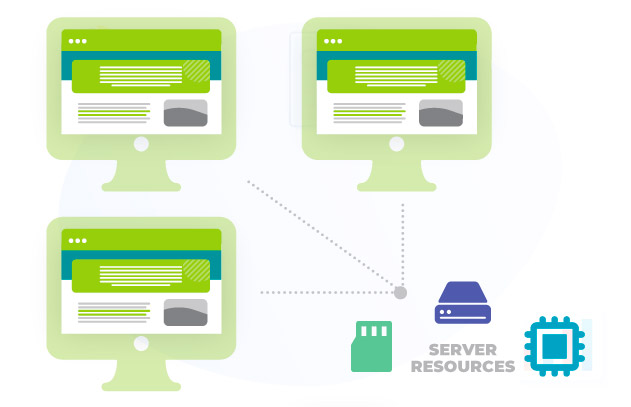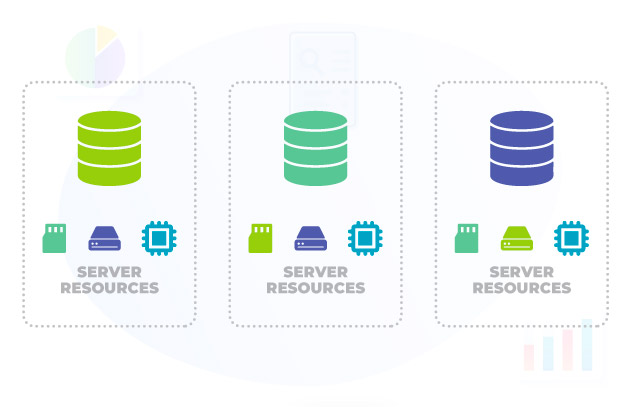
Whether you are taking your business online, starting a personal blog, or creating an online portfolio, you need a host.
But with all the different types of hosting service out there, how do you know which one is right for your website?
Well, I have been in the online marketing industry for more than a decade now.
Over the years, I have tried all types of web hosting from different hosting providers. And I am here to help. Drawing from this wealth of knowledge and expertise, I aim to assist you in making the right choice for your unique needs.
I have compiled all our findings and experience in this blog post to help you choose the best hosting type for your website.
So without further ado, let’s get started.
Table Of Contents
Quick Summary
Web hosting is a service that makes websites accessible online. It includes Shared, VPS, Cloud, Dedicated, Colocation, Managed, and Reseller Hosting.
Each hosting type has pros and cons, and the choice depends on the website’s size, traffic, and the owner’s specific needs.
Managed Web Hosting Services offer technical help, while Reseller Hosting allows users to start a web hosting business without infrastructure investment.
What Is Web Hosting?
Web hosting is a service that allows individuals and organizations to make their websites accessible via the internet by storing website files and data on a web server.

You see, websites are merely a bunch of code, images, and other types of files.
And to view this website on your computer or smartphone, you simply need access to these files.
Here is how it works:
- You -a website owner- upload your website’s data to a server (a computer that is working 24/7.)
- When someone types the URL of your website into their web browser or clicks on your website link, the web browser contacts the server and requests the data.
- The server then sends back the requested data to the web browser via the internet.
- The user gets to see your website live without the need to store anything on their own computer.
And that, my friend, is hosting in a nutshell!
By storing your website on a server, you make it accessible 24/hours a day, 365 days a year to anyone in the world with an internet connection.

Obviously, not all servers are equal. They differ in terms of speed, security, features, and price.
And that’s what we will discuss in the following sections.

The first and most popular type of hosting is shared hosting.
As the name implies, with shared server hosting, your website shares the same server with other websites.
Think of the shared server as a sleepover party.
There are several people (websites) in the same room (server) and you all share the same server resources, such as the living room, TV, and kitchen (CPU, memory, disk space.)

There are many advantages to shared hosting.
First, it’s the cheapest type of hosting. If you are on a tight budget, shared hosting is the way to go.
Second, there are many different packages to choose from, so you can find one that fits your website’s needs.
Third, most shared hosting dedicated servers are managed, which means that hosting companies will take care of security patches, server updates, and other technical aspects of running a server, so you don’t need any technical expertise to use shared hosting.
First, your website’s performance will be affected by other websites on the same server. If one of the websites on the server gets a lot of traffic or uses too many resources, it will slow down the server for everyone else.
Second, there are security risks with shared hosting.
If one of the websites on the server gets hacked, it could put your website at risk as well. This rarely happens, but it’s still something to keep in mind.

Third, you don’t have full control over the server. The hosting provider will determine what types of software can be installed on the server and they will also set some limits on CPU and memory usage.
So, who is shared hosting for?
Shared hosting is perfect for small websites that don’t get a lot of traffic and don’t need a lot of server resources.
It’s also perfect for beginners because it is the cheapest and sometimes you can even score a free domain.
If you have a personal blog, a small business website, or are a beginner I recommend checking our guide on the best shared hosting providers on the market.
2. Virtual Private Server (VPS) Hosting
The second type of hosting is VPS hosting.

VPS stands for Virtual Private Server and it’s created by using software to divide a physical server into multiple isolated servers.
Each virtual server is completely isolated from the others, so you get your own operating system, CPU, memory, and disk space that you don’t share with anyone else.
To understand what VPS hosting is, think of an apartment building.

There are several apartments (VPS) in the same building (Physical Server) but each apartment is a separate unit with its own kitchen, bathroom, and bedroom (CPU, memory, disk space.)
It’s basically a shared server but without the drawbacks of shared hosting.
VPS has many advantages over shared hosting.
First, your website’s performance is not affected by other websites on the server.

Second, you have root access, meaning you can change server settings at the command line code level which is good for very advanced users and developers.
Third, VPS hosting is much more secure than shared hosting because your website is isolated from other websites on the server.
Fourth, VPS gives you the ability to scale your website.
The only downside of VPS is that it’s more expensive than shared hosting.
So, who is VPS hosting for?
VPS hosting is perfect for medium to large websites that get a lot of traffic.
If you have a blog, an eCommerce website, or a business website, check our roundup of the best VPS hosting providers.
3. Cloud Hosting
Cloud is a newer hosting solution that has gained popularity in recent years.
Cloud hosting is similar to VPS hosting in that it uses software to divide a single server into multiple virtual servers.

However, the major difference is that with cloud, your website isn’t stored on one physical server.
Instead, it’s stored on multiple servers (known as a cloud) that are spread out across different locations.
This has several advantages.
First, it’s more reliable because if one server goes down, your website can still be accessed from the other servers in the cloud. This means more uptime.

Second, it’s easier to scale because you do not have to change providers or transfer your website to another server or plan.
Instead, you simply add new servers to your current roster of servers and scale that way.
Third, your website will load much faster because visitors will request your website’s data from the server that’s closest to them. Thus, the data will reach them faster.
This is convenient for websites with a lot of traffic coming from different locations.
Fourth, it’s more secure because your website is spread out across multiple servers, so if one server is hacked, the others will still be safe.
Sadly, there are two disadvantages to the cloud.
The first is that it’s more expensive than shared or VPS hosting because you’re paying for multiple servers.
The second is that it can be more complicated to set up and manage, and if you don’t have the technical knowledge, you’ll need to hire someone who does or opt for a managed WordPress hosting provider, which will cost you more money.
So, who is cloud hosting for?
Cloud is perfect for high-traffic websites that need more uptime and scalability.
To learn more about cloud hosting read our article What is Cloud Hosting?
4. Dedicated Server Hosting
Dedicated hosting is the most powerful and expensive type of host.

With dedicated hosting, your website is the only one on the server, so you have all the resources to yourself.
Think of it as building your own house.
You get the whole house to yourself, you divide it as you like, and you can do whatever you want with it.
Of course, this comes at a price.
Dedicated hosting is much more expensive than shared, VPS, or cloud hosting because you’re paying for the entire server and not sharing it with anyone.

It’s also more complicated to set up and manage because you’re responsible for everything on the server.
If something goes wrong, it’s up to you to fix it.
That being said, dedicated hosting is perfect for businesses that need a very high level of security and performance, such as banks, hospitals, and government websites.
To learn more about dedicated hosting read this article about dedicated hosting.
5. Colocation Hosting
Colocation hosting is a type of dedicated hosting where instead of managing your own dedicated server and taking care of cooling, security, internet connection, and power, you instead rent space from a data center and let them manage all of those things for you.

This is a great option for businesses that want a dedicated server but don’t want to deal with the hassle of maintaining it themselves.
Colocation hosting is also more secure than other types of web hosting options because data centers have state-of-the-art security systems.
6. Managed Web Hosting Services
While many people consider managed hosting to be a type of dedicated hosting, it’s actually a web hosting service that you can get with any type of web server.

You see, when you opt for a dedicated web hosting plan, you can choose to have your server managed or unmanaged.
managed wordpress hosting means that the web hosting service provider will take care of all the technical aspects for you, from securing your server and backing it up to optimizing it for performance, it’s all taken care of for you.
Unmanaged hosting, on the other hand, means that you’re responsible for everything.
You have to secure your server, update it, back it up, and optimize it yourself.
The most common type of managed is managed WordPress hosting.
With this type of dedicated hosting, the web hosting company will optimize your server for the best WordPress performance and security possible.
This means that your WordPress hosting sites will be much faster, more secure, and more reliable.
To find out more about managed hosting providers read our article on the best managed WordPress hosting providers.
7. Reseller Hosting
This is also not a “type of hosting” but people often lump it in with the other types.

Reseller hosting is when you buy a big hosting plan and then sell it to other people.
In other words, you’re a hosting retailer.
You buy hosting in bulk, add your own branding and logo, and then sell it to other people at a markup.
It’s a great way to start your own web hosting company without having to invest in infrastructure.
The only downside is that you’re responsible for customer support.
For more information about reseller hosting read this article about how to get started with reseller hosting.
Frequently Asked Questions (FAQs)
Is WordPress a Web Host?
No, WordPress is not a web host.
It’s a content management system (CMS) that you can use to create a website without having to write any code.
You will need to get hosting in order to install WordPress on your server.

What Is Required to Host a Website?
To host a website, you will need to have a domain name and web hosting options.
A domain name is a URL that people will type in to find your website.

For example, Google’s domain name is google.com.
Web hosting is the service that provides you with a server to host your website.
The office space is your server and the store is your website.
Can Google Host My Website?
Yes, Google can host your website. While Google does offer web hosting services, they won’t host your website for free.
Which Type of Web Hosting is Best For Me?
No matter what type of website you’re looking to create, there’s a web hosting option out there that’s perfect for you.
But we can not tell you what it is. You need to take your time, do your research, and choose the best one for your own needs.
If you’re just getting started, I recommend checking our roundup of the best web hosting for beginners.
It will help you narrow down your options and prevent you from making any mistakes.

